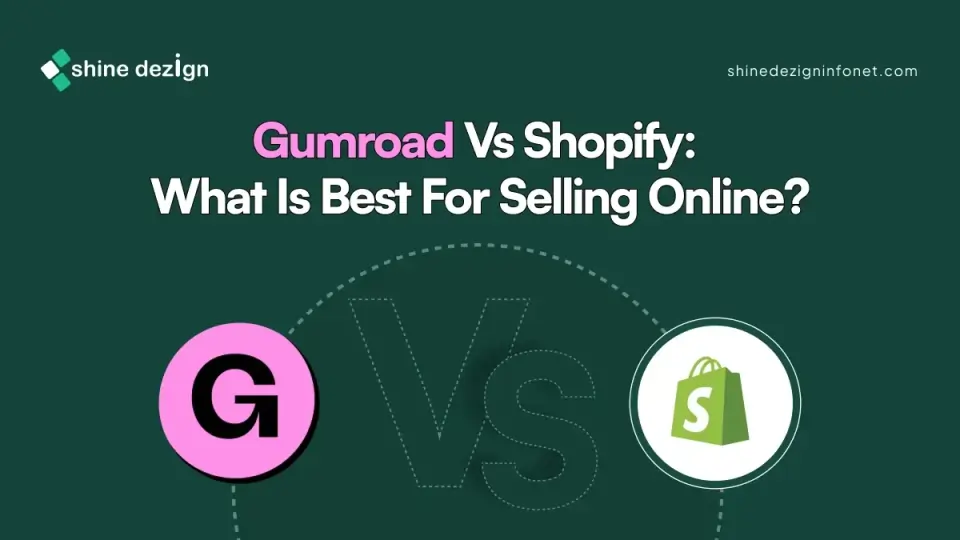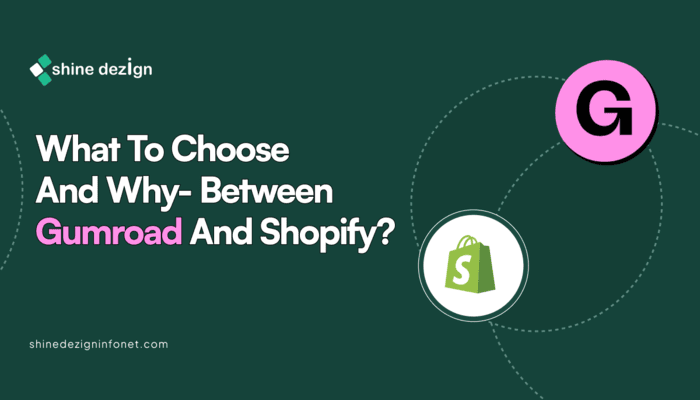Table of Contents
- Introduction
- About Gumroad
- About Shopify
- Pros: Gumroad vs. Shopify
- Cons: Gumroad vs. Shopify
- Gumroad Pricing vs. Shopify Pricing
- What are the Features: Gumroad vs. Shopify?
- Transaction Fees: Gumroad vs. Shopify
- Ease of Use: Gumroad vs. Shopify
- Security: Gumroad vs. Shopify
- Apps and Plugins: Gumroad vs. Shopify
- Gumroad vs Shopify: Complete Comparison Table
- What to Choose and Why- Between Gumroad and Shopify?
- Conclusion
Choosing the right platform is crucial for success. As we look ahead to 2026, two prominent contenders in the e-commerce arena are Gumroad and Shopify. Each platform offers unique features tailored to different types of sellers, from independent creators to established businesses. Artists and digital creators particularly favour Gumroad for its simplicity and direct-to-consumer model. At the same time, Shopify is renowned for its comprehensive e-commerce capabilities, catering to both digital and physical products. This blog will outline the strengths and weaknesses of each platform, enabling you to determine which one is best suited for your online selling needs.
About Gumroad
Gumroad is an online platform that allows creators to sell digital products directly to consumers. It is particularly popular among independent artists, writers, musicians, and other creators who want to monetize their work without the need for a traditional storefront.
About Shopify
Shopify is a leading e-commerce platform that allows individuals and businesses to create their own online stores. It provides a range of tools and features to help users manage their online sales, including website design, payment processing, inventory management, and marketing tools.
Pros: Gumroad vs. Shopify
Pros of Gumroad
- The platform is straightforward and easy to navigate, making it accessible for creators of all skill levels.
- Gumroad operates on a pay-as-you-go model, charging a percentage of sales rather than a monthly subscription fee.
- Creators can sell directly to their audience, fostering a closer relationship with customers.
- Users can set their own prices, offer pay-what-you-want options, and create subscription models.
- Gumroad offers features that help creators effectively promote their products.
Pros of Shopify
- Shopify is designed for users of all skill levels, making it accessible for beginners.
- It offers a wide range of built-in features and third-party apps to enhance store functionality.
- Shopify can accommodate businesses of all sizes, from small startups to large enterprises
- Shopify handles security and compliance, including PCI compliance for payment processing.
- The platform includes built-in SEO features to help improve search engine visibility.
Cons: Gumroad vs. Shopify
Cons of Gumroad
- Gumroad charges a percentage of each sale, which can add up for high-volume sellers.
- The platform offers fewer customization options compared to full-fledged e-commerce solutions, which may limit branding opportunities.
- Gumroad is primarily designed for digital goods, making it less suitable for those looking to sell physical products.
- While Gumroad provides some analytics, they may not be as comprehensive as those offered by other e-commerce platforms.
- While it supports credit cards and PayPal, it may not offer as many payment gateways as other platforms.
Cons of Shopify
- Shopify can be more expensive than some other e-commerce platforms, particularly when additional apps and features are added.
- If users do not use Shopify Payments, they may incur additional transaction fees.
- While Shopify offers many templates, customization options can be limited compared to self-hosted platforms like WordPress with WooCommerce.
- Shopify is primarily focused on e-commerce, which may limit content management capabilities compared to traditional CMS platforms.
- While basic features are easy to use, some advanced functionalities may require a learning curve.
Gumroad Pricing vs. Shopify Pricing
Gumroad Pricing
Gumroad does not charge any monthly subscription fees. Instead, it operates on a per-transaction fee model, which varies depending on how the sale is made:
| Type of Sale | Fee Structure | Notes |
|---|---|---|
| Sales made through your profile or direct links | 10% of transaction amount + $0.50 | Applies when you send customers directly to your Gumroad page or product link |
| Sales made to new customers via marketplace discovery | 30% of the transaction amount | Higher fee because Gumroad helps you acquire new customers through its marketplace |
Shopify Pricing
| Plan | Price / Month | Key Features |
|---|---|---|
| Basic | $29 | • 10 inventory locations • Up to 77% shipping discount • 24/7 chat support • Sell in person |
| Grow | $79 | • Everything in Basic • Up to 88% shipping discount • Insurance • +5 staff accounts |
| Advanced | $299 | • Everything in Grow • +15 staff accounts • Local storefronts by market • 3rd party calculated shipping rates |
| Plus | $2,300 | • Everything in Advanced • Enhanced & prioritized support • Additional premium features |
What are the Features: Gumroad vs. Shopify?
Basic Features: Gumroad vs. Shopify
- Gumroad: Primarily focused on selling digital products, Gumroad offers features like product listings, payment processing, customer management, and basic marketing tools. It enables creators to easily sell eBooks, music, software, and other digital goods.
- Shopify: Shopify is a comprehensive e-commerce platform that supports both digital and physical products. It offers a wide range of features, including customizable templates, inventory management, payment processing, shipping options, and extensive marketing tools. Shopify also has a robust app ecosystem for additional functionalities.
SEO Features: Gumroad vs. Shopify
- Gumroad: While Gumroad provides basic SEO capabilities, such as customizable product URLs and meta descriptions, it lacks advanced SEO tools. This may limit visibility in search engines for creators who rely heavily on organic traffic.
- Shopify: Shopify offers more advanced SEO features, including customizable title tags, meta descriptions, and URL structures. It also provides built-in tools for optimizing product pages and blog content, making it easier for users to improve their search engine rankings.
Performance: Gumroad vs. Shopify
- Gumroad: Gumroad is generally fast and reliable for digital product sales, but performance can vary depending on the number of products and traffic volume. It is optimized for quick downloads and transactions.
- Shopify: Shopify is known for its robust performance and scalability. It can handle high traffic volumes and extensive inventories without compromising speed, making it suitable for businesses of all sizes.
Transaction Fees: Gumroad vs. Shopify
- Gumroad: Gumroad charges a percentage of each sale, which varies based on the user’s plan. This can be a disadvantage for high-volume sellers, as fees can accumulate quickly.
- Shopify: Shopify charges a monthly subscription fee and also incurs transaction fees if users do not use Shopify Payments. The fees vary based on the subscription plan, but they can be more predictable compared to Gumroad’s percentage-based model.
Ease of Use: Gumroad vs. Shopify
- Gumroad: Gumroad is designed for simplicity, making it easy for creators to set up and manage their product listings without technical skills. The user interface is straightforward and intuitive.
- Shopify: is also user-friendly, but its extensive features may require a bit more time to become familiar with. However, once users become familiar with the platform, they can leverage its powerful tools to manage an online store effectively.
Security: Gumroad vs. Shopify
- Gumroad:Gumroad takes security seriously, offering SSL encryption for transactions and protecting user data. However, as a smaller platform, it may not have the same level of security features as larger e-commerce solutions.
- Shopify:is recognized for its robust security measures, including PCI compliance, SSL encryption, and ongoing security updates. It provides a secure environment for both merchants and customers, making it a trusted choice for e-commerce.
Apps and Plugins: Gumroad vs. Shopify
- Gumroad:Gumroad has limited app integrations compared to Shopify. It offers basic marketing tools and features, but users may find fewer options for extending functionality.
- Shopify:Shopify boasts a vast app ecosystem with thousands of apps and plugins available in its app store. Users can enhance their stores with various tools for marketing, inventory management, customer support, and more.
Gumroad vs Shopify: Complete Comparison Table
| Feature/Aspect | Gumroad | Shopify |
|---|---|---|
| Best For | Digital product creators | Businesses selling both digital and physical products |
| Pricing | 10% + $0.50 per transaction | Basic ($29/month), Grow ($79/month), Advanced ($299/month), Plus ($2,300/month) |
| Ease of Use | Simple and intuitive interface | User-friendly but may require a learning curve |
| Customization | Limited customization options | Extensive customization with templates and apps |
| SEO Features | Basic SEO capabilities | Advanced SEO tools for better visibility |
| Performance | Fast for digital sales | Robust performance and scalability |
| Security | SSL encryption, but fewer features | Strong security measures, PCI compliance |
| Dropshipping | Not supported | Well-suited for dropshipping |
| Apps and Plugins | Limited integrations | Vast app ecosystem with thousands of options |
What to Choose and Why- Between Gumroad and Shopify?
When deciding between Gumroad and Shopify, consider the following factors:
Choose Gumroad if:
- You are primarily selling digital products and want a straightforward, low-cost solution.
- You prefer a pay-as-you-go model without monthly fees.
- You want to foster a direct relationship with your customers and have control over pricing.
Choose Shopify if:
- You plan to sell both digital and physical products and need a comprehensive e-commerce solution.
- You require advanced features, extensive customization, and scalability for your business.
- You want to leverage a robust app ecosystem to enhance your store’s functionality.
Conclusion
Both Gumroad and Shopify have their unique advantages and cater to different types of sellers. Gumroad is ideal for independent creators focused on digital products, offering simplicity and direct sales. On the other hand, Shopify provides a powerful e-commerce platform suitable for businesses of all sizes, with extensive features and customization options. Ultimately, the choice between the two will depend on your specific needs, the types of products you offer, and your business goals.
















